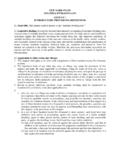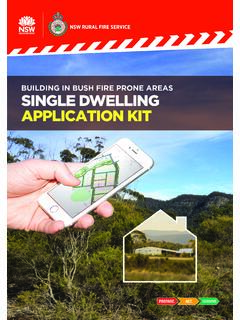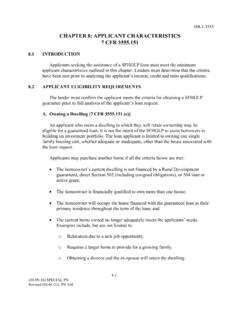Transcription of Building Dwelling Thinking - University of Utah
1 Building Dwelling ~arch543p/ of 91/6/2007 11:24 AM Building Dwelling Thinkingby Martin Heideggerfrom Poetry, Language, Thought, translated by Albert Hofstadter, Harper Colophon Books, New York, what follows we shall try to think about Dwelling and Building . This Thinking about Building does notpresume to discover architectural ideas, let alone to give rules for Building . This venture in thought does notview Building as an art or as a technique of construction; rather it traces Building back into that domain towhich everything that is belongs.
2 We ask:1. What is it to dwell?2. How does Building belong to Dwelling ? IWe attain to Dwelling , so it seems, only by means of Building . The latter, Building , has the former, Dwelling ,as its goal. Still, not every Building is a Dwelling . Bridges and hangars, stadiums and power stations arebuildings but not dwellings; railway stations and highways, dams and market halls are built, but they are notdwelling places. Even so, these buildings are in the domain of our Dwelling . That domain extends over thesebuildings and yet is not limited to the Dwelling place.
3 The truck driver is at home on the highway, but he doesnot have his shelter there; the working woman is at home in the spinning mill, but does not have her dwellingplace there; the chief engineer is at home in the power station, but he does not dwell there. These buildingshouse man. He inhabits them and yet does not dwell in them, when to dwell means merely that we takeshelter in them. In today's housing shortage even this much is reassuring and to the good; residential buildingsdo indeed provide shelter; today's houses may even be well planned, easy to keep, attractively cheap, open toair, light, and sun, but-do the houses in themselves hold any guarantee that Dwelling occurs in them?
4 Yetthose buildings that are not Dwelling places remain in turn determined by Dwelling insofar as they serve man'sdwelling. Thus Dwelling would in any case be the end that presides over all Building . Dwelling and buildingare related as end and means. However, as long as this is all we have in mind, we take Dwelling and buildingas two separate activities, an idea that has something correct in it. Yet at the same time by the means-endschema we block our view of the essential relations. For Building is not merely a means and a way towarddwelling -to build is in itself already to dwell.
5 Who tells us this? Who gives us a standard at all by which wecan take the measure of the nature of Dwelling and Building ?It is language that tells us about the nature of a thing, provided that we respect language's own nature. In themeantime, to be sure, there rages round the earth an unbridled yet clever talking, writing, and broadcasting ofspoken words. Man acts as though he were the shaper and master of language, while in fact language remainsthe master of man. Perhaps it is before all else man's subversion of this relation of dominance that drives hisBuilding Dwelling ~arch543p/ of 91/6/2007 11:24 AMnature into alienation.
6 That we retain a concern for care in speaking is all to the good, but it is of no help to usas long as language still serves us even then only as a means of expression. Among all the appeals that wehuman beings, on our part, can help to be voiced, language is the highest and everywhere the , then, does Bauen, Building , mean? The Old English and High German word for Building , buan, means to dwell. This signifies: to remain, to stay in a place. The real meaning of the verb bauen, namely, to dwell, has been lost to us.
7 But a covert trace of it has been preserved in the German word Nachbar, neighbor. The neighbor is in Old English the neahgehur; neah, near, and gebur, dweller. The Nachbar is the Nachgebur, theNachgebauer, the near-dweller, he who dwells nearby. The verbs buri, b ren, beuren, beuron, all signify Dwelling , the abode, the place of Dwelling . Now to be sure the old word buan not only tells us that bauen, to build, is really to dwell; it also gives us a clue as to how we have to think about the Dwelling it we speak of Dwelling we usually think of an activity that man performs alongside many other work here and dwell there.
8 We do not merely dwell-that would be virtual inactivity-we practice aprofession, we do business, we travel and lodge on the way, now here, now there. Bauen originally means to dwell. Where the word bauen still speaks in its original sense it also says how far the nature of dwellingreaches. That is, bauen, buan. bhu, beo are our word bin in the versions: ich bin, I am, du bist, you are, the imperative form bis, be. What then does ich bin mean? The old word bauen, to which the bin belongs, answers: ich bin, du bist mean: I dwell, you dwell.
9 The way in which you are and I am, the manner in whichwe humans are on the earth, is Buan, Dwelling . To be a human being means to be on the earth as a mortal. itmeans to dwell. The old word bauen, which says that man is insofar as he dwells, this word barren however also means at the same time to cherish and protect, to preserve and care for, specifically to till the soil, tocultivate the vine. Such Building only takes care-it tends the growth that ripens into its fruit of its own in the sense of preserving and nurturing is not making anything.
10 Shipbuilding and temple- Building ,on the other hand, do in a certain way make their own works. Here Building , in contrast with cultivating, is aconstructing. Both modes of Building - Building as cultivating, Latin colere, cultura, and Building as the raising up of edifices, aedificare -are comprised within genuine Building , that is, Dwelling . Building as Dwelling , thatis, as being on the earth, however, remains for man's everyday experience that which is from the outset"habitual"-we inhabit it, as our language says so beautifully: it is the Gewohnte.







